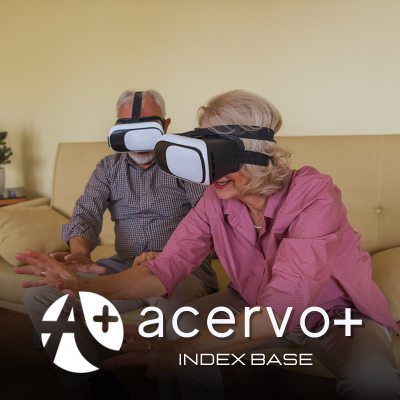Jogos de realidade virtual imersiva no tratamento da doença de Parkinson
##plugins.themes.bootstrap3.article.main##
Resumo
Objetivo: Avaliar a usabilidade e viabilidade de quatro jogos de Realidade Virtual Imersiva (RVI) como possível tratamento para disfunções de membros superiores em pacientes com Doença de Parkinson (DP). Métodos: Participaram deste estudo 10 pacientes com sintomas moderados de DP segundo a classificação de Hoehn e Yahr. A usabilidade dos jogos e do dispositivo foi avaliada por meio de questionários como Sickness Simulator Questionnaire (SSQ), System Usability Scale (SUS), Game Experience Questionnaire (GEQ post-module) e a escala de Borg modificada. As pontuações dos jogos em duas sessões de treinamento, separadas por um intervalo de 30 minutos, foram registradas como medida de viabilidade do treinamento. Resultados: A usabilidade do sistema foi considerada "melhor imaginável" (94,5/100) conforme a SUS. Os efeitos colaterais foram classificados como “sintomas mínimos” (9,3 pontos no SSQ) e não interromperam o treinamento. Os jogos e o dispositivo alcançaram 3,85/4 pontos no GEQ. Os participantes melhoraram significativamente em todos os quatro jogos entre a primeira e segunda sessões de treino. Conclusão: As pontuações nos jogos aumentaram progressivamente. Os resultados sugerem a usabilidade e viabilidade dos jogos de RVI, porém, estudos mais amplos são necessários para confirmar esses resultados preliminares.
##plugins.themes.bootstrap3.article.details##
Copyright © | Todos os direitos reservados.
A revista detém os direitos autorais exclusivos de publicação deste artigo nos termos da lei 9610/98.
Reprodução parcial
É livre o uso de partes do texto, figuras e questionário do artigo, sendo obrigatória a citação dos autores e revista.
Reprodução total
É expressamente proibida, devendo ser autorizada pela revista.
Referências
2. ARMSTRONG MJ e OKUN MS. Diagnosis and Treatment of Parkinson Disease. JAMA, 2020; 323: 548–60.
3. BALESTRINO R e SCHAPIRA AHV. Parkinson disease. European Journal of Neurology, 2019; 27: 27–42.
4. BANGOR A, et al.User Experience Magazine. Determining What Individual SUS Scores Mean: Adding an Adjective Rating ScaleJUS. Uxpajournalorg, 2020.
5. BIMBERG P, et al. On the Usage of the Simulator Sickness Questionnaire for Virtual Reality Research. 2020 IEEE Conference on Virtual Reality and 3D User Interfaces Abstracts and Workshops (VRW), 2020.
6. CALABRESI P, et al. Dopamine-mediated regulation of corticostriatal synaptic plasticity. Trends in Neurosciences, 2007; 30: 211–9.
7. CAMPO-PRIETO P, et al. Wearable Immersive Virtual Reality Device for Promoting Physical Activity in Parkinson’s Disease Patients. Sensors, 2022; 22: 3302.
8. CARNEVALE A, et al. Virtual Reality for Shoulder Rehabilitation: Accuracy Evaluation of Oculus Quest 2. Sensors, 2022; 22: 5511.
9. CARVALHO MR de, et al. Simulator Sickness Questionnaire: tradução e adaptação transcultural. Jornal Brasileiro de Psiquiatria, 2011; 60: 247–52.
10. CHEN Z, et al. Autonomic dysfunction in Parkinson’s disease: Implications for pathophysiology, diagnosis, and treatment. Neurobiology of Disease, 2020; 134: 104700.
11. DORSEY ER e Bloem BR. The Parkinson Pandemic—A Call to Action. JAMA Neurology, 2018; 75: 9.
12. Goodwin VA, et al. The effectiveness of exercise interventions for people with Parkinson’s disease: A systematic review and meta-analysis. Movement Disorders, 2008; 23: 631–40.
13. HUANG K-T. Exergaming Executive Functions: An Immersive Virtual Reality-Based Cognitive Training for Adults Aged 50 and Older. Cyberpsychology, Behavior, and Social Networking, 2019.
14. IJSSELSTEIJN WA, et al. The Game Experience Questionnaire. Researchtuenl 2013. Disponível em: https //research.tue.nl/en/publications/the-game-experience-questionnaire. Acessado em: 09 de agosto de 2024.
15. KIM A, et al. Walking in fully immersive virtual environments: an evaluation of potential adverse effects in older adults and individuals with Parkinson’s disease. Journal of NeuroEngineering and Rehabilitation . 2017; 14.
16. LIANG Y e LAU PWC. Effects of Active Videogames on Physical Activity and Related Outcomes Among Healthy Children: A Systematic Review. Games for Health Journal, 2014; 3: 122–44.
17. LOURENÇO DF, et al. Translation and Cross-Cultural Adaptation of the System Usability Scale to Brazilian Portuguese. Aquichan, 2022; 22: 1–16.
18. MA M e ZHENG H. Virtual Reality and Serious Games in Healthcare. Advanced Computational Intelligence Paradigms in Healthcare 6 Virtual Reality in Psychotherapy, Rehabilitation, and Assessment, 2011; 169–92.
19. MENDES FA Dos S, et al. Motor learning, retention and transfer after virtual-reality-based training in Parkinson’s disease – effect of motor and cognitive demands of games: a longitudinal, controlled clinical study. Physiotherapy, 2012; 98: 217–23.
20. PENKO AL, et al. Borg scale is valid for ratings of perceived exertion for individuals with Parkinson’s disease. International Journal of Exercise Science, 2017; 10: 76–86.
21. RADDER DLM, et al. Physiotherapy in Parkinson’s Disease: A Meta-Analysis of Present Treatment Modalities. Neurorehabilitation and Neural Repair, 2020; 34: 154596832095279.
22. SARIC L, et al. Usability of Two New Interactive Game Sensor-Based Hand Training Devices in Parkinson’s Disease. Sensors 2022; 22:6278.
23. TRIEGAARDT J, et al. Correction to: The role of virtual reality on outcomes in rehabilitation of Parkinson’s disease: meta-analysis and systematic review in 1031 participants. Neurological Sciences 2020; 41:731–2.

